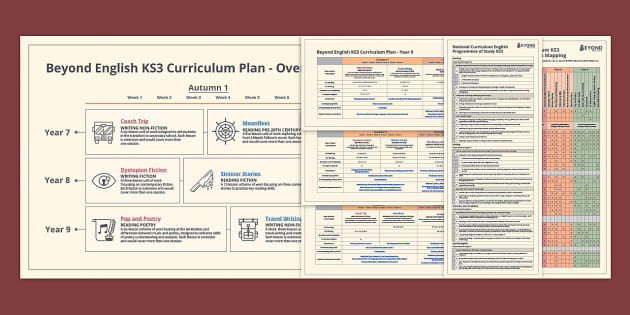KS3 English Curriculum: Nurturing Language Proficiency
The Key Stage 3 (KS3) English curriculum in the UK plays a pivotal role in shaping students’ linguistic abilities and fostering a deep appreciation for the English language. As students transition from primary to secondary education, the KS3 curriculum lays the foundation for their language proficiency, encompassing various essential skills and competencies.
Introduction to KS3 English Curriculum
What is KS3?
The Key Stage 3 English curriculum is designed for students aged 11 to 14 in secondary education. It forms a crucial bridge between primary and secondary schooling, aiming to enhance students’ English language skills and literacy.
Importance of English Curriculum
English proficiency is fundamental for academic success and personal development. The Key Stage 3 curriculum not only equips students with essential language skills but also cultivates critical thinking, creativity, and communication abilities.
Key Components of KS3 English Curriculum
Reading Skills
Developing reading comprehension skills is central to the KS3 English curriculum. Students explore a diverse range of texts, including fiction, non-fiction, poetry, and drama, enhancing their understanding, analysis, and interpretation abilities.
Writing Skills
The curriculum emphasizes the development of writing skills, encompassing various genres such as narrative, descriptive, persuasive, and informative writing. Students learn to express themselves effectively, structure their ideas coherently, and use language creatively.
Speaking and Listening Skills
Effective communication is nurtured through activities that promote speaking and listening skills. Students engage in discussions, debates, presentations, and role-plays, fostering confidence, articulation, and active listening.
Grammar and Vocabulary
Mastery of grammar and vocabulary is vital for clear and precise communication. The curriculum includes dedicated lessons on grammar rules, syntax, punctuation, and vocabulary expansion, enabling students to refine their language usage.
Structure of KS3 English Curriculum
Year 7 Curriculum Overview
In Year 7, students build upon their primary education foundation, focusing on consolidating basic literacy skills and exploring a variety of literary genres and forms.
Year 8 Curriculum Overview
Year 8 expands on the foundational knowledge acquired in Year 7, introducing more complex texts, analytical tasks, and writing assignments to challenge students’ comprehension and composition abilities further.
Year 9 Curriculum Overview
In Year 9, students prepare for the transition to Key Stage 4, honing their skills through in-depth study of literary classics, advanced writing tasks, and critical analysis exercises.
Teaching Methods and Resources
Innovative Teaching Strategies
Educators employ innovative pedagogical approaches such as inquiry-based learning, collaborative projects, and differentiated instruction to cater to diverse learning styles and abilities.
Utilization of Technology
Integration of technology enhances learning experiences, with interactive multimedia resources, digital libraries, and online platforms facilitating independent study and collaborative learning.
Recommended Resources
A plethora of resources, including textbooks, literature anthologies, online databases, and educational websites, support the delivery of the KS3 English curriculum, offering rich content and supplementary materials.
Assessment and Evaluation
Formative Assessment
Formative assessment strategies, such as quizzes, peer feedback, and writing workshops, provide ongoing feedback to students, enabling them to monitor their progress and identify areas for improvement.
Summative Assessment
Summative assessments, including exams, essays, and projects, measure students’ achievement against learning objectives and academic standards, providing a comprehensive evaluation of their proficiency.
Feedback Mechanisms
Timely and constructive feedback from teachers fosters continuous improvement, guiding students in refining their skills, addressing weaknesses, and setting goals for further development.
Challenges and Solutions
Addressing Diverse Learning Needs
Tailoring instruction to accommodate diverse learning needs, including language barriers, learning disabilities, and cultural differences, ensures equitable access to the curriculum and promotes inclusive education.
Engaging Students
Implementing interactive and engaging teaching methods, incorporating real-world relevance and student interests, enhances motivation, participation, and enthusiasm for learning.
Overcoming Resource Constraints
Efforts to overcome resource constraints, such as limited funding, insufficient materials, and overcrowded classrooms, involve innovative solutions, community partnerships, and advocacy for educational equity.
Impact of KS3 English Curriculum
Academic Performance
The KS3 English curriculum significantly influences students’ academic performance, laying the groundwork for success in Key Stage 4 and beyond, across various subjects and disciplines.
Skill Development
Beyond academic outcomes, the curriculum fosters holistic skill development, including critical thinking, communication, creativity, and cultural awareness, preparing students for lifelong learning and personal growth.
Future Opportunities
Proficiency in English opens doors to a myriad of opportunities, including higher education, career advancement, and global citizenship, empowering students to thrive in an increasingly interconnected world.
Conclusion
The KS3 English curriculum is a cornerstone of secondary education, nurturing language proficiency, critical thinking, and communication skills essential for academic success and personal development. By providing a comprehensive framework for language learning and literacy, it equips students with the tools they need to navigate the complexities of the modern world and pursue their aspirations with confidence.




